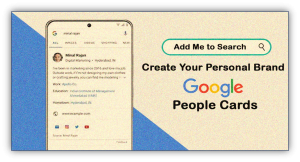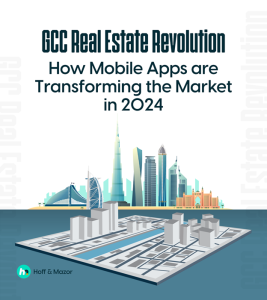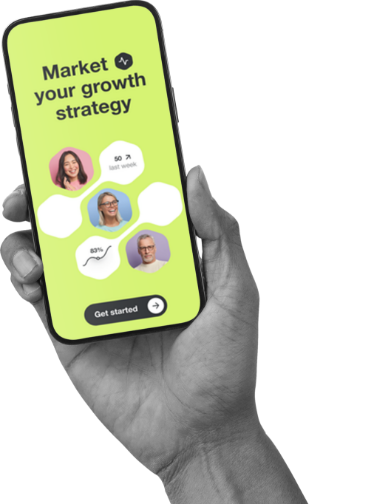Empower Your App’s Success With Our Comprehensive Guide
Having a fully-functional mobile app is an excellent contribution to your business. But, revealing it rightly to the audience is the key. You have crossed many steps but the crucial one is still awaiting.
Now is the time to tackle the hard part- enabling people to use your app. With the competitively evolving digital era, getting the attention from the audience has been difficult with over 2 millions apps available in the app store. Don’t worry; we’ve got you covered.
The Importance of Marketing for Mobile Apps
An effective marketing campaign will spread the word about your new app, attract users, drive downloads, and ultimately impact your ranking in the app stores. Marketing plays a phenomenal role in the digital world to capture the attention of your contribution to the field. To make sure your app is known, hiring a mobile app developer and marketing are the key.
- Use social media to spread the word about your new app and offer promotions to build buzz.
- Choose effective keywords and a compelling app description to rank higher in searches.
- Pay attention to user reviews and make improvements to address concerns.
- Keep an eye on changes in platforms, devices, and user behaviors.
The Fundamentals of Mobile App Marketing
To successfully market your app, you must master the mobile engagement loop. This loop refers to the cycle of:
- Acquiring new users
- Engaging and re-engaging users
- Analyzing user behavior and optimizing the experience
The key to successfully marketing your mobile app is understanding the typical stages and planning your approach. The significant steps usually include:
- Research your target audience.
- Develop a marketing plan that incorporates your research findings.
- Build a website to help establish your brand and be a central hub for all your marketing efforts.
- Creating content like blog posts, videos, and social media posts to spread the word about your app.
- Optimizing search engines and app stores to increase visibility.
- Collaborating with influencers who can help promote your app to their followers.
- Driving installs through paid advertising on social media, search engines, and app stores.
- Analyzing key metrics to see how users engage with your app and make improvements.
Identifying Your Target Audience
You need to identify your target audience to market your mobile app successfully. This means researching and defining who your ideal app users are. The best way to do this is by creating user personas. If you are unsure on how to do this properly you can always outsource to an agency.
A persona is a representation of your target customer that includes details like:
- Demographics (age, income, location)
- Behaviors and interests
- Goals and challenges
- How they’re likely to use your app
Defining your audience is an ongoing process that requires continually connecting with users and evaluating how people engage with your app. However, investing the time upfront to identify your target audience will set you up for success and empower your marketing efforts.
Thorough Market Research
- You must understand your target customers and competition to market your mobile app successfully. Conducting in-depth market research will provide invaluable insights to guide your marketing strategy.
- Do primary research through surveys, focus groups, and interviews. Ask open ended questions examples to discover what people want and need. See how they currently solve problems your app could help with.
- Also, do secondary research, analyzing reports and studies on your target audience and industry. Look at trends in the app stores to find gaps your app could fill.
- The more you understand your customers and competitors, the more empowered you’ll be to market your app successfully. The comprehensive market research gives you a competitive advantage by revealing insights your rivals may miss.
Pre-Launch App Marketing Strategy
- A solid pre-launch marketing strategy will build excitement and set the stage for your app’s success.
- Start planning at least 6-8 weeks before launch to generate buzz and get people counting down the days until your app hits the market.
1. Build your foundation
- Start building your email list and social media following early.
- Offer a signup on your website to collect emails, run a giveaway or contest to increase signups, and promote your accounts on all major platforms.
- Post regular updates, behind-the-scenes info, and teasers to keep people engaged.
- Setting an Early Timeline
When you plan to launch your app, work backward to set critical milestones. Allow at least 6-12 weeks for pre-launch marketing. The more time you give yourself, the more you can build anticipation and buzz.
2. Conducting Market Analysis
Learn who your target users are, their needs, and how your app can meet them. Analyze your competitors to see how you can differentiate yourself. This research will shape how you position and message your app.
3. Target Audience and Competitors
You must define and understand your target audience to market your mobile app development company successfully. Who will be most interested in your app? Are there any direct competitors you need to be aware of?
4. Creating an Engaging Landing Page
Design an eye-catching landing page to capture interest and excite people about your new app. Include captivating visuals, a short video demo, and clear call-to-action buttons.
5. Leveraging Social Media Platforms
Promote your app on platforms where your target users spend time, like Facebook, Instagram, and Twitter. Add to the hype by posting updates and behind-the-scenes photos and engage with your followers. Run social media contests and giveaways to increase the buzz.
6. Harnessing the Power of Email Marketing
Build an email list of interested users and send regular updates about your app’s progress. Offer beta access or discount codes to your email subscribers first. Personalized, targeted emails have high open and click-through rates, so get to know your users and tailor content to their needs.
The Stages of Mobile App Marketing Strategy
1. The Awareness Stage
Once your app is built, it’s time to spread the word. Your audience needs to know about your app to make sure they use it well. Setting a strategic launch date and working backward to plan your promotional activities is essential. Initially, build excitement by offering previews, sneak peeks, and beta testing opportunities.
The website is your digital home. Create a simple website or landing page to build your email list and social following. Build interest by offering a contest or giveaway. Engage your future users by asking for input or running a poll on features.
To let people know about your app, social media is your way to aware the audience on broader terms. Whether it’s connecting with influencers in your niche and offering them access to your app for an honest review to posting your best features, you can enable people to become likely interested in your product.
With connecting rightly with the target audience on platforms like Tiktok, Facebook, Instagram, and Twitter, you can engage with people. It is easy to post updates, behind-the-scenes info, and teasers to invite people to delve further. From giveaways to contests, social media provides an array of engagement options. Social media is a crucial way to spread the word about your app to potential users.
2. The Acquisition Stage
Once your app is live, utilize paid advertising to increase downloads and get more users. With the right acquisition strategy, you’ll gain many new users and see your app’s success proliferate.
Pay-per-click ads on social media or the App Store can drive traffic to your app’s page. Be strategic with your ad targeting to reach your target audience and test different creatives and copy to optimize your ad performance.
Choose engaging app screenshots, a well-written description, and smart keywords that people search for. High rankings mean more people will discover your app organically. Moreover, always remember to monitor your app’s keywords and adjust as needed to climb the charts.
In addition, Videos are highly effective for demonstrating an app’s capabilities and user experience. Create short video walkthroughs highlighting your app’s key features and functionality. Post them on your app’s website, social media channels, and video platforms like YouTube.
3. The Retention Stage
Once your app is live and users have had a chance to download it, the real work begins. This is the retention stage, where you must keep people returning and using your app. It will be unsuccessful if people download your app but never open it again.
The user experience (UX) is key. Make your app intuitive, easy to navigate, and simple to use. Offer helpful tutorials or walkthroughs for new users. Provide value right away so people see the benefit of your app quickly. A great UX will keep people coming back.
Push notifications are a must, but don’t overdo it and annoy your users. Send relevant alerts about the app’s new content, features, or activity. Make notifications personalized based on user preferences or past behavior in the app.
Give your users a reason to come back, like offering credits, coupons, or special unlocks after a certain number of sessions. You can highlight new features, content, or activities to encourage repeat visits.
With the right retention strategy, you’ll build a dedicated base of loyal users who keep coming back to your app. Focus on crafting a stellar UX, sending engaging push alerts, offering incentives, making improvements based on analytics, and keeping your app fresh. Keep your users happy, and they’ll stick with you!
4. Paid Promotion Strategies
Once you’ve built your mobile app, it’s time to get it in front of users. Paid advertising is one of the most effective ways to gain significant exposure and boost downloads. Here are some of the top paid promotion strategies to consider:
5. Social Media Ads
Social media is home to millions of users. Making the most of it is now in your hands to ensure your apps never go unnoticed. Promoting your app on platforms like Tiktok, Facebook, Instagram, and Twitter is necessary. These channels have massive reach and targeting options to connect you with your ideal users. You can run ads to increase brand awareness, drive traffic to your app store listing, and prompt downloads.
6. Google Universal App Campaigns
Google UACs make showing your app to potential users across Google Search, the Google Play Store, YouTube, and the Google Display Network easy. You only have to set up one campaign to reach people on their favorite Google properties. UACs optimize automatically to give you the best results within your budget. It is your time to shine bright and let your app reach every corner.
7. Influencer Marketing
Partnering with influencers in your niche is an authentic way to spread the word about your new app. Reach out to influencers with an engaged following and ask them to promote your app through social posts, YouTube videos, podcast mentions, and more. In exchange, you can offer them compensation, free access to your app, or a customized promotional code for their followers.
8. Native Advertising
Native ads blend in with the content around them, so they don’t feel like disruptive ads to users. You can run native app install ads on platforms like Outbrain, Taboola, and Revcontent to get your app in front of audiences reading content related to your app’s category. The ads appear as suggested content at the end of articles, drawing clicks from readers interested in your topic.
Conclusion
Finally, you are done with the easy guide to unlock your keys to marketing your mobile app. We pave your path to success and increase user engagement with marketing that unravels the marvels. While it may seem to be too much to deal with, focusing on each one will serve the right purpose.
Don’t get overwhelmed by trying to do everything at once. Pick the channels and tactics you think resonate most with your target users and double down on those. Marketing is a continuous cycle and getting it done once will not make any difference. Keep improving on each step to let your hustle be your voice of success.
If you put in the effort to create a terrific app and are committed to getting it in front of the appropriate people, you’ll be well on your way to mobile app marketing success. Now, get out there and make it happen! Your app is waiting.







